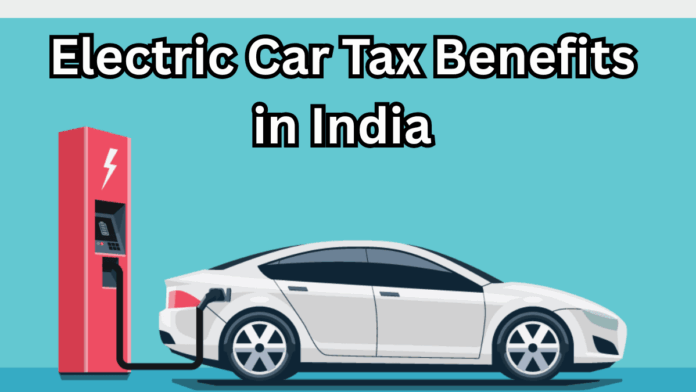As India moves rapidly toward a sustainable future, electric vehicles (EVs) are no longer just a trend — they’re a practical and rewarding investment. The government is actively encouraging EV adoption through various tax benefits and policy perks that make 2025 an ideal year to go electric.
In this article, we’ll explore the key electric car tax benefits in India for 2025, helping you understand how these savings work and how you can make the most of them.
Contents
- Why Electric Cars Are the Future of Indian Roads
- Major Electric Car Tax Benefits in India for 2025
- State-Specific EV Policy Perks You Should Know
- Who Can Claim EV Tax Deductions in India?
- For Individual Buyers:
- For Businesses:
- Additional Perks for EV Buyers in 2025
- FAQs
- Q1. What is the maximum tax deduction available for electric car loans in 2025?
- Q2. Are GST rates lower for EVs compared to regular cars in 2025?
- Q3. Can I avail both state subsidy and central tax benefits for my EV purchase?
- Q4. Are businesses eligible for EV-related tax relief in India?
- Final Thoughts
Why Electric Cars Are the Future of Indian Roads
With fuel prices constantly rising and environmental concerns growing, EVs are emerging as the preferred choice for modern, responsible consumers. What’s making them even more appealing is the slew of financial incentives available in 2025.
Here’s why making the switch makes sense:
-
Attractive tax deductions on EV loans
-
Lower GST rates for electric vehicles
-
Exemptions from registration fees and road tax
-
State-specific subsidies and incentives under updated EV policies
Major Electric Car Tax Benefits in India for 2025
The Indian government has introduced a range of EV tax deductions in India to make electric cars more accessible and affordable. Below is a breakdown of the most important tax benefits:
| Benefit Type | Description |
|---|---|
| Section 80EEB Deduction | Up to ₹1.5 lakh deduction on interest paid on loans for electric vehicles |
| GST Reduction | 5% GST on EVs compared to 28% on petrol and diesel vehicles |
| No Road Tax & Registration Fee | Several states provide complete waivers on these costs |
| Depreciation for Businesses | Up to 40% depreciation in the first year for EVs used in business operations |
| State-Level Subsidies | Additional upfront discounts under various state EV policies |
These electric car tax benefits in India for 2025 are designed to reduce the cost of ownership and promote widespread EV usage.
State-Specific EV Policy Perks You Should Know
Alongside central government incentives, individual states are offering their own EV policy perks that further reduce the cost of switching to electric. Here’s a look at what some major states offer:
| State | Key EV Policy Perks |
|---|---|
| Delhi | Up to ₹1.5 lakh subsidy, waiver on road tax and registration fees |
| Maharashtra | Subsidies up to ₹2.5 lakh, additional bonuses for scrapping older vehicles |
| Tamil Nadu | Full road tax exemption and capital subsidies for EV infrastructure development |
| Karnataka | Complete exemption from registration fees and road tax |
| Gujarat | Up to ₹1.5 lakh subsidy on electric cars under state government’s EV promotion scheme |
These EV policy perks vary by state but can make a huge difference in your total savings.
Who Can Claim EV Tax Deductions in India?
Whether you’re an individual buyer or a business owner, there are tax benefits available for you in 2025.
For Individual Buyers:
-
Must have taken a loan to purchase an electric car
-
Deduction of up to ₹1.5 lakh on interest under Section 80EEB
-
The vehicle should be registered in the individual’s name
For Businesses:
-
EVs used for business purposes are eligible for accelerated depreciation (up to 40%)
-
Can significantly lower taxable income through asset depreciation
These EV tax deductions in India make electric vehicles a great option for both personal and commercial use.
Additional Perks for EV Buyers in 2025
Apart from tax deductions, there are several practical advantages of owning an electric car in 2025:
-
Lower cost of running (electricity is cheaper than petrol or diesel)
-
Reduced maintenance due to fewer moving parts
-
Priority parking spaces in some cities
-
Expanding EV charging infrastructure across urban and semi-urban areas
These added conveniences make the EV switch even more worthwhile.
FAQs
Q1. What is the maximum tax deduction available for electric car loans in 2025?
A: You can claim up to ₹1.5 lakh as a deduction on interest paid on electric car loans under Section 80EEB.
Q2. Are GST rates lower for EVs compared to regular cars in 2025?
A: Yes. Electric vehicles are taxed at just 5% GST, while conventional vehicles attract a rate of 28%.
Q3. Can I avail both state subsidy and central tax benefits for my EV purchase?
A: Yes, you can claim both. The central government offers tax deductions, while states provide upfront purchase subsidies.
A: Absolutely. Businesses can claim up to 40% depreciation on EVs used for commercial purposes in the first year of purchase.
Final Thoughts
If you’ve been thinking about buying an electric vehicle, 2025 offers the perfect blend of affordability, policy support, and infrastructure readiness. With generous electric car tax benefits in India for 2025, comprehensive EV policy perks, and low running costs, EVs are becoming the smart choice for modern Indian consumers.
The financial and environmental benefits are clear — the future of driving in India is electric.

Chandler is an avid automobile enthusiast who is passionate about all things on wheels. From the latest car models to classic vintage rides, I love exploring the automotive world’s intricate details and engineering marvels. With years of experience in test-driving, reviewing, and analyzing cars, I provide readers with comprehensive insights and honest opinions.



























